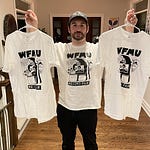(To enjoy this newsletter in proper context, please press play before reading.)
Editor’s Note:
I’m not a “write through it” kind of person. Whatever phrase people use to describe “the ability to work at a high level even when you are not mentally well” these days, I am the opposite of that. I have no interest in “gutting it out” or “grinding through it,” as I am not a 2nd baseman or shooting guard.
My brain isn’t able to process when things are going insane, especially when it involves racism or racism-related events. I have a lot of envy for those who saw what happened on Wednesday and were able to put out a newsletter in the following days. That ain’t me.
The history of this country had proven that when American white supremacist terrorism like what happened at the Capitol last Wednesday takes place, that terrorism is coming to my front door, sooner or later.
Consider this my mea culpa of sorts. I’ll do better in the future by letting you know when a Tuesday/Thursday newsletter isn’t coming in advance, but I felt it was essential to lead with that.
Now, onto new business…the second anniversary of this newsletter is in two weeks. For those who might be reading for the first time or if you’re new to the newsletter, here’s what this whole thing is about, and who it is for.
WHAT IS THIS THING?
Office Hours with Ernest Wilkins is a newsletter about the business of culture. The weekly newsletter and podcast employ a loose magazine-style format. Subscribers can expect personal essays, criticism, interviews, playlists, recommendations, and analysis of culture's business from me, Ernest Wilkins.
Follow me on Twitter and follow the newsletter on Instagram.
What does "the business of culture" actually mean?
The business of culture is precisely that—the research and study of cultural industries.
This newsletter falls into a middle ground between analysis of individual cultural industries (like motion pictures, music, fashion, or video games) and the broader study of how all of them interconnect to create the world we live in.
It sounds more intense than it actually is. If anything, this is all just me realizing that nobody is going to do it, so I might as well?
The emergence of cultural industries as complex, intertwined sectors that share many common characteristics and are joined by a web of collaboration and corporate ownerships is worthy of the respect that comes with analytical study for many reasons.
Before the emergence of cultural industries, humans were primarily driven by parental upbringing, communal contact, tribal similarities, morals, and codes, not to mention things like a religious congregation.
Cultural industries do not replace these institutions, but you better believe that they have reduced their influence considerably. Indeed, as far as most folks are concerned, cultural industries have taken the place of home and community as the dominant source of values and beliefs. Don’t believe me? How else can you explain how Fox News took off or the enduring appeal of the NFL?
It is weird to me that we don't pay more attention to the apparent impact of cultural industries on society. Cultural industries do not merely represent a significant set of economic activities but also enormous social importance. By design (and accident, as the last 5 years have shown us), cultural industries greatly influence what we care about, how we feel about ourselves, how we live, and how we die.
This momentous shift has elicited fear and antagonism from many who distrust the economic and business imperatives that shape most cultural industries. The culture vultures, the predators, and those who would prefer if certain sections of the population didn’t exist.
Prejudice is an obvious bias that has harmed how cultural industries are covered, researched and studied, from what cultural institutions are “worthy” of study vs. which ones are looked at as mere anomalies or a “lucky” break.
Haven’t you ever wondered why nobody in the broader “business media” looked at what Master P did in 1998 the same way that they look at the formation of other businesses like (insert buzzy startup that already crashed and burned)?
One can definitely argue that the success of No Limit Records has had a broader cultural influence on the world than most apps that have billions in valuation.
THAT is what this newsletter is about is about. (I already wrote that one, btw)
Research that yields a deeper understanding of the practices and dilemmas that face the organizations and individuals in these industries would obviously be of substantial value to people looking to make some $, but what do I know?
The second reason for studying cultural industries, and one that flows directly from the first, is our obvious fascination with these industries.
Cultural industries have long been the topic of intense public passion. At the risk of getting too meta, that desire has been not only supported, but reinforced by extensive media coverage. Yes, there are people who don’t care about the business of music or sports or food or art, but willingly or unwillingly, everyone who lives in modern society participates in these industries. The narratives, dramas and overall conversation dominate our lives in ways we don’t even realize.
As any journalist will tell you, cultural industries are more amenable to narrative escape and dramatic enactment. It’s really hard to make crop futures sound exciting, you know? Beyond the immediate engagement, however, the extensive media coverage of cultural industries is now an industry in its own right—it has its own specialists, organizations, practices and channels of distribution (coughSubstackcough).
At the heart of the research and study of the business of culture to me is the cult of the celebrity. This cult did not come into being with the emergence of cultural initiatives. Still, there is little doubt that you can't have one without the other, like love and marriage.
That we know star performers and celebrated talent not only for what they do on the screen or on the stage but also for how they live is not unusual for humans. Remember: We're socially-based, so people who have a lot of popularity will always be observed as “important”. What is nuts to me and what I’m definitely going to dig into more is the degree to which celebrities' lives contribute to the development and distribution of cultural products.
To me, a creative products doesn’t need a specific type: Sometimes a creative product is a song. Sometimes it’s a sneaker.
In this newsletter, Travi$ Scott’s Astroworld project and his McDonalds partnership are the same thing. The representation of a creative vision.
As such, that perspective belies my overall vision for this newsletter. I want to talk about how culture is created, bought, marketed, and sold. If culture is a commodity, then the way we cover culture should change to reflect that.
Many people wrongly believe that culture cannot be commoditized because it is intangible — it’s a spiritual concept. You just...know.
That’s where we keep screwing up. I believe that once we assume that culture belongs to the spiritual realm, we disassociate it with “real” things. Like money. The niche I'm filling seems broad, but when you look closely, you’ll quickly learn it ain’t really that deep.
Simply put: The people who want things to stay the way they are want you to believe that culture has nothing to do with money.
If I can stick the landing here, we can change that, improving these industries for the generations to come. Who’s with me?
WHY AM I DOING THIS?
The way I see it, it's my responsibility to leave it better than I found it. 2020 proved to me that the dilemmas faced by cultural industries are becoming increasingly relevant to a broad cross-section of people across a wide range of industries that have nothing to do with culture at all. Like a wise man once said, we’re gonna need a bigger boat.
WHO IS THE IDEAL OFFICE HOURS READER?
I provide a lot of value for a very specific kind of reader.
In the interest of not wasting anyone's time, I've outlined who the ideal Office Hours w/me subscriber is:
The Office Hours with Ernest Wilkins subscriber is someone who:
got in trouble a lot as a kid for asking "why"?
knows that everyone comes with preloaded biases, including themselves.
doesn't assume everyone has had the same life experience and is genuinely interested in learning about others.
is a critical thinker.
believes in the following philosophies: Occam's Razor, Fast/Good/Cheap - Pick 2, being nice to administrative staff and public transit drivers.
is one of those forever-curious people that have zero problems spending hours researching something they saw on Twitter.
is a marginalized American working in cultural businesses, especially on the creative side.
is white and has more than two friends of color.
believes in themselves, even when it's tough sometimes.
is a later Gen-X/Millennial/early Gen-Z Chicagoan or was born and raised in the Midwest between 1980 and 2013.
is a media industry survivor.
is a media industry veteran who turned off their joy to survive and miss being excited about new things.
Is about...30% bro. You not only watch sports, but you have "a team." FWIW, I consider Rupaul's Drag Race and the OG Bad Girls Club as sports.
likes moodboards but has never signed up for Pinterest.
is in an interracial marriage or long-term interracial relationship.
is focused on how people interact with each other, both in-person and online.
knows not only who Funkmaster Flex is, but what a "bomb drop" means as a sign of cultural approval.
is a minority that grew up around white people and lived to tell about it.
is a white person that grew up around minorities and knows what's really going on out here.
is a former inside kid.
still subscribes to print magazines and still buys (makes?) cool zines.
works in advertising or marketing but still has friends that would roast them for days if they called themselves a "polymath" or "thought leader."
has parents who know you work in marketing/media/advertising but have no clue what you actually do for a living.
is white and has listened to It's Dark and Hell Is Hot, 400 Degreez, Ruff Ryders Vol. 1, In Search Of..., Lord Willin', XXX, and the first two Missy Elliott albums at least twice.
is the type to ask for books for their birthday or holiday gifts.
doesn't feel the need to tell everyone how good or cool they are all the time.
has ADHD and loves an excellent impulsive...anything.
is the type of person that doesn't need the whole thing laid out for them and is willing to do the work to find the answer.
is from the African Diaspora, has read The Preppy Handbook, owns 1-3 preppy items and/or a Triple-R: a Really Rare Ralph piece.
is a Black professional in the business of culture, trying to learn how to speak to white people.
is a white professional in the business of culture who know they should be doing better, but don't know where to start (and/or are too embarrassed to ask).
is a data person in the business of culture trying to learn how to do their jobs better.
is an idea people in the business of culture trying to learn how to do their jobs better.
has taste but would never make someone feel bad for not having any.
plays a sport, if only for exercise.
works in the buying, marketing, selling, or creation of culture.
is an artist that is tired of being asked dumb questions in interviews but is willing to be disagreed with publicly, if needed.
is one of "the people behind the people."
is "the mayor" of their city, let their friends tell it.
loved Vine and miss it every day.
smokes weed, even if they don't really put it out there like that.
grew up rich but recognize they got lucky instead of being a dick about it
went to a big American state college and actually went to class between hangovers. (bonus points if it was a football factory.)
people who have strong love and affection for the 90s Fox television sitcoms King of The Hill and Living Single.
loves cool clothes and actually has some capital-F fashion garments on-deck, but would instead buy vintage than splash out on something new.
I'm stealing this one from my SUPERSTAR mentee Safy Hallan-Farah, who’s newsletter you should subscribe to RIGHT NOW: "Is obsessed with how certain corporations try to sell counterculture. Would make a great in-house theorist somewhere, or an MTV VJ."
MUSIC THING:
1st new playlist of 2021 is here from YOUR BOY, The King of Very Specific Vibes:
Cool Pandemic Dinner Party
Tunes from dvsn, Alan Parsons Project, Larry June, Brandy, Teenage Priest, SIMPSON, Chaka Khan and a few more heaters. Spotify-only for now, Tidal and Apple Music later tonight, follow me on Twitter and I’ll let you know when it drops. Please stay in the house!
SUPPORT THIS THING:
Did you know that for less than it costs to get a bucket of beers, you can support an independent media startup?
Become a paid supporter of Office Hours with Ernest Wilkins on an ongoing basis today. $7 a month or $75 a year.
Can’t do a paid subscription right now? Consider showing your support for my work with a one-time donation!
Office Hours with Ernest Wilkins is written and curated by Ernest Wilkins in Chicago, Illinois.













Share this post